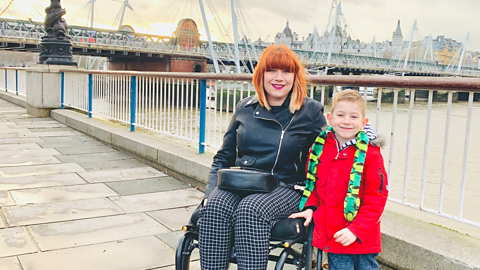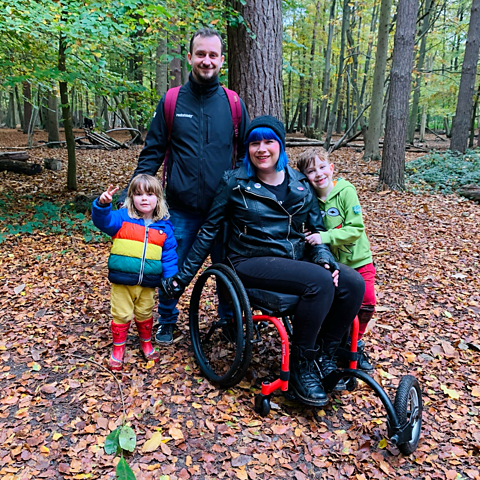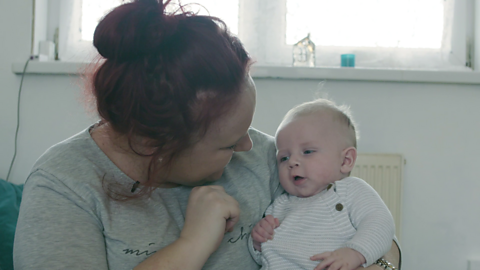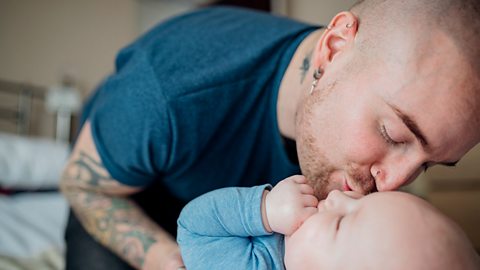Nina Tame is a counsellor and disability mentor, mum to four sons and says the biggest challenge about being a parent with spina bifida is other people’s perceptions about disability. We caught up with her to chat a bit more about her story.
I’ve had three different experiences of being a parent. With my elder two, who are 15 and 13, I parented on two legs and could take them places independently. Then, when I got pregnant with my third son Clark, one of my legs began to give way and I started using a walking stick. Over the next few years, my mobility got progressively worse and I was using a wheelchair by the time I got pregnant with my youngest Cary.
There are limitations as a disabled parent; I'd be lying if I said there weren’t. Cary’s nearly 3, but I still wouldn't feel confident taking him to the park on my own, in case he bolted and I couldn’t catch up. And there are days when I look back to when it was easier to do things outside of the house. It’d be nice to just jump in the car and take Cary out for lunch without having to worry about whether a café is accessible.
But then that's literally it, in terms of how my disability affects me as a parent. My youngest two have only ever known life with me as I am now. We play, we read, we make stuff, we go out on weekends when my partner Jason's around. I can’t chase the little ones around the house on my legs, but I can still chase them in my chair. My eldest son said recently as he watched us: “Mum, this is like the game we used to play when we were kids.” And he was right, it is exactly the same.

Working as a team
I think people look at me and my partner Jason and make a lot of presumptions about us. That Jase must be some sort of hero because he’s with a disabled woman.
But we’re a partnership. When Cary was tiny, Jase would stand up, hold him and rock him. And I would sit down and breastfeed because that's the bit I could do. Now Jase does the manual stuff and bedtimes with the boys but when it comes to admin, that's all me. I know exactly when the kids have birthday parties or what’s going on at school.
Losing my mobility made me challenge the pressures that I'd put on myself and the expectations of what I felt I should be doing as a mum. It’s made me realise how much stress mums put on themselves to do everything.

Finding my voice
It’s only in the last two years that I’ve been talking openly about disability on social media. But since I started, lots of younger people have messaged to say how much I’ve helped them. Recently, I did a set of Stories on my Instagram about incontinence. Very open, very honest, absolutely no shame. And it really hit me how much these open conversations would have helped me hugely in my teens and 20s.
When I was growing up, I knew I was disabled but it wasn’t something I identified with. I didn't use any mobility aids, so you wouldn't have known I was disabled just by looking at me. Disability was a label that I felt quite shameful about. A secret that I tried to hide. I didn't have any disabled people in my life or anyone to talk to about all these complex feelings.A few things happened all at once that shifted my mindset.
Clark also has a disability and when he started school wearing a leg brace, he was asked constant questions that really started to wear him down. He just wanted to play and do what 5-year-old kids do, but someone else would be asking “What’s this on your leg?”.
This coincided with me discovering a disabled community on Instagram through the hashtag #babewithamobilityaid. I saw all these diverse, vibrant people looking amazing. This just changed everything: I’d spent the last five years trying to hide my walking stick or crutches in pictures.
I think one of the first Instagram posts I wrote was about how much I hated being asked intrusive questions every day. Lots of people responded saying “Me too!” and it was massively reassuring. A realisation that I didn’t have to be this polite, quiet person trying to fit in anymore.
It started a new journey for me, talking about disability issues, the history of disabled people and our treatment. It gave me the confidence to say to Clark: “You don’t need to explain yourself to these people any more. Tell them that your mum said so.”I’m now a disability mentor for other people and I absolutely love it because I get to be the person that I needed when I was younger. My big plan is to write a guidebook that empowers disabled kids. I was told I could do anything, just like everybody else. But actually, I knew I wasn’t like everyone else. And when no one's talking about your disability, it becomes a source of shame. It doesn’t have to be this way.

Dealing with people’s perceptions
While my thoughts on disability have changed, society and other people’s perceptions haven’t shifted so much. There are things we’d like to do as a family but rubbish access does not allow it. If I want to go to the theatre, I can only get one wheelchair ticket and one carer’s ticket – I can’t get six seats next to each other, so we can all be together.
Sometimes it feels like non-disabled people don’t understand that disabled people can be parents. That if you need extra care, you’re probably not able to give care. But we are just like non-disabled people. Some of us can have kids, some of us can’t.
Parenting has its challenges for everyone
What I’d say to other parents with disabilities is that it’s really important to find your community; for support, for validation, even for just practical advice. For example, I had no clue how to safely hold Cary on me while I was on my mobility scooter, so I asked my online community. This sharing of information is an absolute lifeline, especially because as a disabled parent, you can feel really isolated too.
And what I really want non-disabled people to know is that disabled parents exist and are just as capable of loving, giving care and bringing up a happy child as a non-disabled person.
The things that are difficult about parenting for Jase and me are the same things for everyone: worrying that the kids are happy and that they’re eating food other than chicken nuggets. Never anything to do with me being in a wheelchair.
Follow Nina on .






